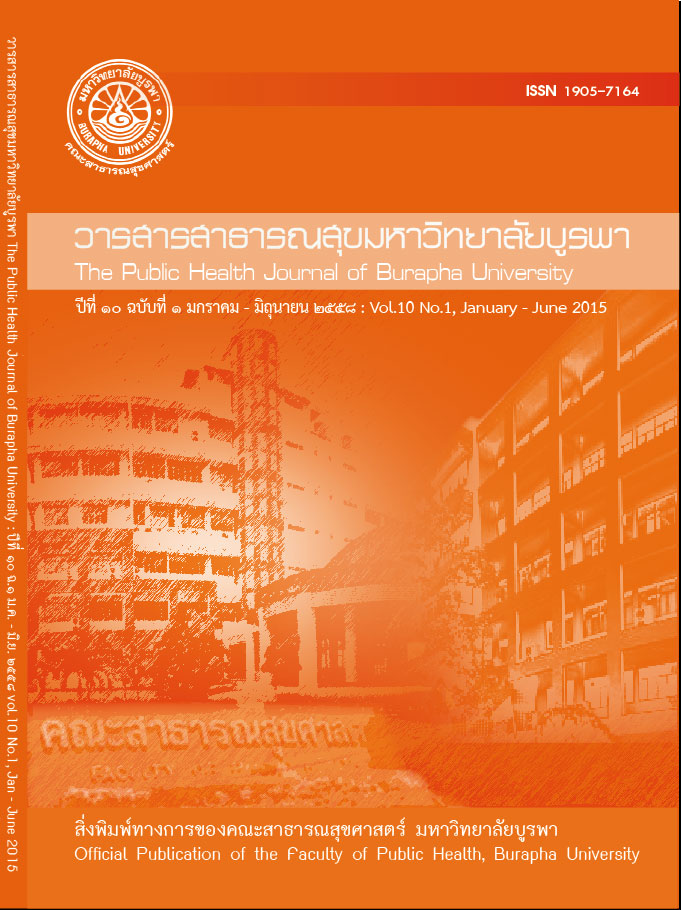Effects of Providing Scientific Experiences on Emotional Intelligence in Early Childhood
Main Article Content
บทคัดย่อ
ผลของการจัดประสบการณ์ทางวิทยาศาสตร์ต่อความฉลาดทางอารมณ์ ในเด็กปฐมวัย
พรวลี นิ่มศิริสุวรรณ*, ปิยะธิดา ขจรชัยกุล*, ศุภชัย ปิติกุลตัง*, สุพร อภินันทเวช**
* ภาควิชาอนามัยครอบครัว คณะสาธารณสุขศาสตร์ มหาวิทยาลัยมหิดล
**ภาควิชาจิตเวชศาสตร์ คณะแพทยศาสตร์ศิริราชพยาบาล มหาวิทยาลัยมหิดล
การวิจัยนี้มีวัตถุประสงค์เพื่อศึกษาผลของการจัดประสบการณ์ทางวิทยาศาสตร์เพื่อเสริมสร้าง ความฉลาดทางอารมณ์ในเด็กปฐมวัย กลุ่มตัวอย่างเป็น เด็กอายุ4-5 ปีที่กำลังศึกษาอยู่ชั้นอนุบาล ในเขตบางกอกน้อย กรุงเทพมหานคร แบ่งเป็นกลุ่มทดลองและกลุ่มเปรียบเทียบ กลุ่มละ 30 คน กลุ่มทดลองได้รับกิจกรรมการจัดประสบการณ์ทางวิทยาศาสตร์เพื่อเสริมสร้างความฉลาดทางอารมณ์ จำนวน 8 กิจกรรมเป็นระยะเวลา 4 สัปดาห์กลุ่มเปรียบเทียบได้รับการเรียนการสอนตามหลักสูตร ปกติที่โรงเรียนจัดให้เก็บรวบรวมข้อมูลด้วยแบบประเมินความฉลาดทางอารมณ์เด็กอายุ 3-5 ปี สำหรับครู/ผู้ดูแลเด็กวิเคราะห์ข้อมูลโดยใช้การแจกแจงความถี่ ร้อยละ ค่าเฉลี่ย ส่วนเบี่ยงเบน มาตรฐาน และการทดสอบค่า t-test
ผลการวิจัยพบว่า หลังการทดลอง เด็กปฐมวัยกลุ่มทดลองมีคะแนนความฉลาดทางอารมณ์ สูงกว่าก่อนการทดลองและสูงกว่ากลุ่มเปรียบเทียบอย่างมีนัยสำคัญทางสถิติ (p < .001)
ครูสามารถนำกิจกรรมการจัดประสบการณ์ทางวิทยาศาสตร์เพื่อเสริมสร้างความฉลาดทาง อารมณ์ในเด็กปฐมวัยไปใช้เป็นแนวทางในการจัดการเรียนรู้ด้านการเรียนการสอน ซึ่งจะเป็นประโยชน์ ในการส่งเสริมให้เด็กปฐมวัยมีพัฒนาการทางอารมณ์ที่ด
The research was conducted to study the effects of providing scientific experiences on emotional intelligence in early childhood. Thirty kindergarteners, who were four to five years old, in the educational service area of Bangkoknoi District, Bangkok were assigned to the experimental group and to the comparison group. The research was conducted for four weeks, and eight scientific activities were constructed to enhance emotional intelligence. The comparison group received the regular course of instruction provided by the school. The data was collected using the teacher’s evaluation of the emotional intelligence of the children. The data was analyzed using frequency, percentage, mean and standard deviation, and a paired sample t-test.
The results showed that the experimental group’s emotional intelligence scores after the experiment were higher than the pre-experiment scores, and higher than the comparison group (p < .001). Teachers should encourage these scientific experiences and activities in the classroom to boost emotional intelligence in early childhood. It can be useful in promoting children's emotional development.

